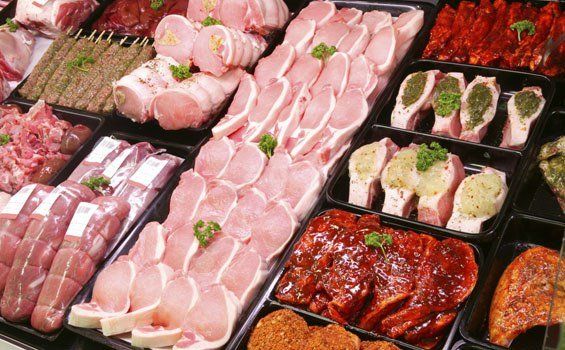Why Buying at a Local Meat Market Guarantees Fresh, High-Quality Cuts
Purchasing at a local meat market provides distinct advantages that usually go unnoticed by consumers accustomed to bigger retail chains. These markets offer direct accessibility to fresh, high-grade cuts, an outcome of reduced transport time from farm to respond to. This not only improves taste but also supports local farmers, fostering community relationships and lasting practices. Rigorous high quality control determines make certain that each acquisition meets high criteria of safety and quality. Yet, the ramifications of choosing local expand beyond immediate advantages, prompting a closer examination of what this selection truly suggests for both customers and the local economic climate.
Benefits of Neighborhood Sourcing
In the realm of food procurement, the benefits of neighborhood sourcing stand out plainly. By acquiring meat from regional markets, consumers gain straight accessibility to items that are frequently fresher and a lot more savory than those found in larger, commercial grocery stores. Neighborhood sourcing reduces the moment and distance food travels from ranch to table, which not only enhances preference but also protects nutritional value.

Moreover, regional sourcing commonly offers openness concerning the beginnings of the meat. Customers can make inquiries concerning the farming practices made use of, pet well-being standards, and whether the meat is grass-fed or natural. This information equips consumers to make informed choices lined up with their values.
Quality Assurance Requirements
Regional meat markets frequently stick to strenuous quality assurance standards that guarantee the products used meet high security and quality benchmarks. These standards typically encompass different phases of the meat production procedure, from sourcing to dealing with and storage space.
First, local markets frequently develop rigid vendor standards, ensuring that only trusted farms and producers are made use of - bagley meat market edwardsville il. This lowers the likelihood of contamination and promotes greater animal welfare standards. Furthermore, many neighborhood meat markets apply normal assessments to confirm that the meat is processed under sanitary conditions, better reducing wellness dangers
Temperature control is an additional important element of quality control. Local meat markets frequently check refrigeration systems to maintain optimal storage space temperature levels, ensuring that meat remains fresh and secure for usage. Additionally, the implementation of traceability systems allows markets to track the origin of their products, supplying transparency and liability.
Finally, personnel at local meat markets are often educated to acknowledge indications of wasting and recognize proper handling techniques. This commitment to quality assurance not just raises the overall standard of the meat but additionally cultivates consumer count on, making neighborhood meat markets a reliable source for top quality cuts.
Supporting Regional Farmers
Sustaining neighborhood farmers is necessary for cultivating a sustainable food system and boosting neighborhood durability. When consumers choose to go shopping at local meat markets, they straight add to the livelihoods of farmers in their area. This not just supports the regional economy however likewise enhances the agricultural market, making sure that it continues to be sensible and vibrant.


In addition, supporting neighborhood farmers cultivates a feeling of neighborhood and link in between manufacturers and customers. It urges transparency in food sourcing and infuses trust, as consumers can create connections with the individuals who raise their food. This direct connection inevitably leads to a more involved and educated public, which is crucial for advocating for lasting agricultural methods in the future.
Sustainable Practices
Lasting methods in meat markets play a critical duty in promoting environmental stewardship and ensuring pet well-being. Neighborhood meat markets usually focus on sourcing their products from farms that implement honest and sustainable farming techniques. These methods include rotational grazing, which assists keep dirt wellness and minimizes carbon exhausts, together with minimizing using anti-biotics and hormones in animals.
Furthermore, neighborhood meat markets normally stress transparency in their supply chains. Clients are supplied with details concerning the origin of their meat, allowing them to make enlightened options that line up with their values. By sustaining neighborhood farmers that exercise lasting methods, customers add to the preservation of biodiversity and the reduction of transportation emissions related to long-distance meat distribution.
Additionally, numerous regional meat markets involve in waste decrease techniques, such as using every component of the animal and promoting off-cuts that might otherwise go unsold. By promoting a more lasting approach to meat usage, these markets not only provide top quality products however also add positively to the atmosphere and pet well-being. Essentially, purchasing at a regional meat market lines up consumers with a wider activity in the direction of liable and moral food sourcing.
Individualized Customer Solution
Buying at a meat market frequently encompasses greater than simply the products offered; it is additionally about the experience and the relationships built in between customers and personnel. Personalized customer support is a hallmark of local meat markets, establishing them apart from larger grocery chains. Educated staff look at here make the effort to recognize individual client choices, guaranteeing that each go to is tailored to particular requirements.
Consumers gain from skilled suggestions on cuts, food preparation methods, and preparation ideas, promoting a feeling of trust and commitment. This personalized interaction allows clients to ask concerns and seek suggestions, resulting in notified getting choices. Team member often bear in mind routine customers and their choices, creating a welcoming environment that cultivates neighborhood connections.
Additionally, tailored service encompasses special demands, such as custom-made cuts or certain preparation methods, which bigger merchants may not suit. This degree of interest enhances the commitment of local meat markets to high quality and consumer fulfillment.
Fundamentally, individualized client solution not only boosts the shopping experience but likewise guarantees that consumers entrust to the most effective products matched to their culinary needs, making every browse through a gratifying one.
Verdict
Sustaining neighborhood farmers promotes neighborhood relationships and reinforces the local economy, while sustainable techniques contribute to ecological stewardship. Additionally, tailored consumer solution improves the buying experience, making neighborhood meat markets a favored selection for consumers looking for both top quality and moral considerations in their food sourcing.
The implications of picking local expand beyond immediate benefits, prompting a better examination of what this option really implies for both customers and the local economy.
Sustaining local meat markets like it additionally contributes to the local economy. Local meat markets regularly monitor refrigeration systems to maintain optimal storage temperature levels, ensuring that meat continues to be safe and fresh for consumption.Regional farmers are typically a lot more attuned to the specific requirements of their areas, elevating and growing crops livestock that align with local preferences and preferences. Sustaining local farmers cultivates community partnerships and enhances the local economic climate, while sustainable techniques add to ecological stewardship.